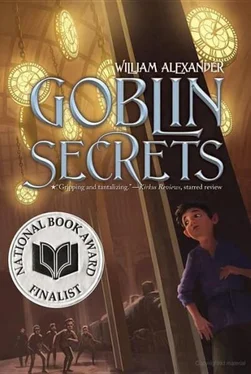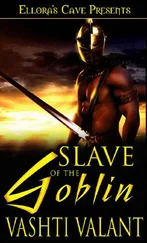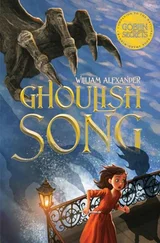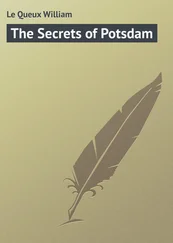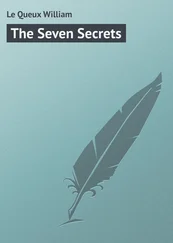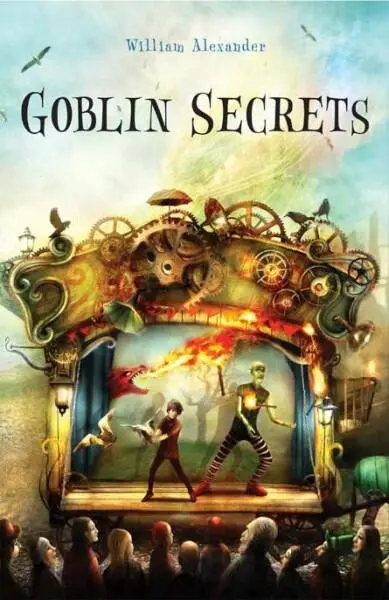
Goblin Secrets
by William Alexander
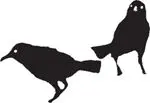
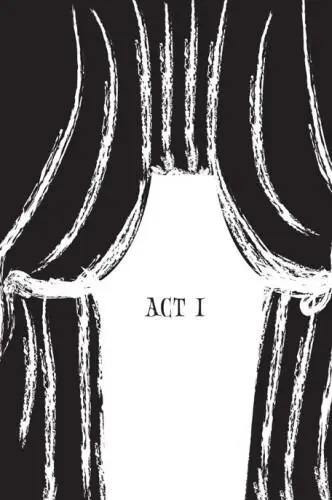

ROWNIE WOKE WHEN GRABA knocked on the ceiling from the other side. Plaster dust drifted down from the knocking. Graba knocked again. Baskets hung on chains from the rafters, and they shook when she knocked.
Rownie sat up and tried to blink sleep-sand and plaster dust from one eye. The whole floor was covered by a bed made up of straw, stolen clothes sewn into blankets, and sleeping siblings. Two of his brothers crawled up out of the straw, Blotches and Stubble. Blotches had orange hair, orange freckles, and orange teeth. Stubble was the oldest and the tallest, and he liked to say that he had a beard. He didn’t. He had stray hairs on the tip of his chin and on his cheeks near his ears.
Their sister Vass came in from the girls’ room, which was really the same room with a blanket hung across the middle. Vass had been her name before she came to live with Graba. Sometimes Graba’s grandchildren kept the names they had before. Sometimes they made up names for themselves. Blotches and Stubble had made up their own names.
“Hurry,” Vass snapped.
Rownie got to his feet, combed the straw out of his hair with his fingers, and stumbled away from the middle of the room. He stood with Vass and Blotches while Stubble pulled the rope that lowered the stairway down from the ceiling. The musty smell of Graba’s loft came down with it.
Vass went upstairs. The others followed her. Rownie came last.
There were birds everywhere in Graba’s loft. Most were pigeons, gray and mangy. Some were chickens. A few larger, stranger birds perched in dark corners, watchful.
Graba perched on a stool near the iron stove, her legs hidden underneath the bulk of her gray skirts.
“Four grandchildren,” she said. “Today I have four of you. Enough for what I have in mind now.”
The word “ grandmother ” did not mean “mother’s mother” or “father’s mother” to Rownie, or to the various other children who sometimes lived in Graba’s shack. Neither mothers nor fathers were part of this household, and the word “ grandmother ” simply meant “Graba.”
The four children lined up in front of the stool, waiting. Two chickens pecked at the floorboards nearby, looking for seeds.
“I’ll need eggs carried to Haggot’s market stall,” said Graba. She pointed to Stubble and Blotches, but she did not say their names. She probably did not know their names. “He’ll be at the Northside market today. Trade the eggs for feed-grain, the best chicken feed you can find. Bring it back to me. Will you do that, now?”
“Yes, Graba.” Stubble picked up a wooden crate filled with straw and eggs. All four siblings turned to go.
“Don’t be going yet,” Graba said. She took a small leather bag from around her neck and held it out to Vass. “Hang this over the chains on the Clock Tower door. Sing the charm I was teaching you last night, and stand back when you do. Take care with this, now. It is a present of welcoming home, and it’s almost ripe.”
Vass took the bag carefully. “What’s in it?” she asked.
“A bird skull, stuffed with other things. Do this well, and I might be teaching you the making of it.”
“Yes, Graba,” said Vass.
“Go,” Graba said. “All of you but the runt, the smallest one. Rownie should wait here with me.”
Rownie waited. He wondered why Graba knew his name. She knew the names of those she kept an eye on, and it was not always a good thing to have Graba’s eye on you.
He listened to Vass, Stubble, and Blotches clamber down the stairs.
“Yes, Graba?” Rownie asked.
“My leg bones have run down,” she told him. “Wind them for me now.” She extended a gearwork leg from under her stool. It was bird-shaped, with three long talon-toes in front and one in back, at the heel. The whole limb had been made out of copper and wood.
Rownie pried the crank out from her shin and wound it up, watching gears turn against chains and springs inside.
Graba always said that Mr. Scrud, the local gearworker, hadn’t enough skill to make legs into human shapes. Vass whispered that Graba needed the chicken legs to hold up her hugeness, that nothing smaller would suffice, and that Graba wouldn’t be able to walk today if she hadn’t lost the ordinary legs she’d been born with.
Stubble said that Graba used to be a sailor, or a boat-witch, and that she’d lost her legs in a pirate attack. He said Graba killed some of the pirates with a look and a laugh and a lock of her hair before they cut off her legs with rusty swords. He always drew out the word “rusty” when he told the story. “Rrrrrrrrusty swords. Ha!” Then he’d hit Rownie behind the knee with a stick to buckle him over.
Stubble told this story often. Rownie had cried the first time, and the rest of Graba’s grandchildren had laughed. On the second telling Rownie had glared up at Stubble from the ground. The third time Stubble told the tale Rownie had fallen backward on purpose, throwing up his hands and imitating Graba’s rusty voice. “Curse you, Pirate King!” (The story had grown by then, and the ordinary river pirates had become a full barge captained by the King of All Pirates.)
Everybody had laughed. Stubble had helped him up, and after that he didn’t hit Rownie so hard while telling the pirate story, because Rownie couldn’t say his line if he was gasping in pain and holding his leg. It still hurt, but not as much.
Now the story was almost a play. This was dangerous. Performances were outlawed in Zombay.
Rownie finished turning the left crank as far as it would go and folded it into the shin. Graba pulled back her left leg and then extended her right. Rownie pried out the crank and turned it once. The joint gave a loud, shrill creaking. Graba waved her hands and scowled.
“Needs oil,” she said. She reached up into the rafters and into one of the nests. She plucked out a small brown egg and popped it into her mouth. It crunched. “I haven’t any gear oil left,” she said around the cracking eggshell. “Get to Scrud’s shop for a small flask, now. I’ve overpaid him for leg repair, and he owes me for it. Don’t let him tell you otherwise.”
“Yes, Graba,” Rownie said. He folded back the crank, dodged around a chicken, and ran down the stairs.
He grabbed his coat, even though it was a little too warm outside for coats, and tried to leave through the door. The door wouldn’t budge. Rownie remembered that it couldn’t budge. Graba moved her house around sometimes. She would send everyone out, lift up the shack, and go somewhere else. Then she would let everyone back in after they found her, if they ever did find her. The last time Graba moved her house, she set the front door against a neighboring wall. “Just use a window,” she had said when Vass complained. “I like my view better this way.”
Rownie climbed through the window and dropped down to the street.

THE SOUTH SIDE OF THE CITY was dusty. Rownie tried not to step in any of the dust piles that littered the street. Every morning sweepers swept their houses, and they left large, brown piles outside their doorsteps. Every day the dust came slowly back inside and covered the floors. There was a kind of fish that swam in Southside dust, and a kind of bird that fished with their long beaks in the dust dunes. The lives of sweepers became interesting during dustfish spawning season.
Читать дальше
